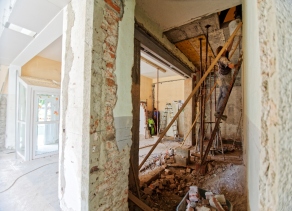 Top real estate professionals are always on the lookout for new tools and technology solutions to help their businesses gain a competitive advantage over their competitors. Plus, it’s also getting harder and harder to compete in the real estate industry without utilizing the right technology solutions.
Top real estate professionals are always on the lookout for new tools and technology solutions to help their businesses gain a competitive advantage over their competitors. Plus, it’s also getting harder and harder to compete in the real estate industry without utilizing the right technology solutions.
To help determine the software solution that will be the right fit for your processes and business model, it’s helpful to first start by asking yourself these two questions;
What are the challenges your team faces?
One of the first steps in finding right software solution is by talking with your team about their processes and identifying the obstacles and challenges they face on a daily basis. For example;
Has it become increasingly difficult to manage multiple clients and deals at once?
Would automating the credit and background checks alleviate more time that could be spent working with new clients?
Do you often come across deals you cannot fund?
Once the challenges have been uncovered, you can then determine new objectives and goals that can help alleviate these challenges.
What are you looking for in a new software?
Examine your workflows and speak with your team to learn where inefficiencies or tedious tasks are. Then, determine what you are looking for in a technology that can help solve these.
Potential Software Objectives:
- Conduct Better Deals (and More Deals)
- Seamless Communication (Internally and Externally)
- Secure Paperless Document & Fee Collection
- Workflow Automation
- Professionalizing the Process
- Integration with Vendors & Other Resources
- Establishing Referral Connections
Ask your team if there are any technology solutions they’ve researched and been curious about. Then encourage them to schedule a demonstration of the software to determine if it would work for your company as a whole.
Bridge Loan Network’s Loan Management System
With our Loan Management System (LMS) companies can manage and track all their loans, upload and store documents, run soft and hard credit checks, pull background reports and conveniently send full loan packages to approved lenders, or your lender of choice.
Bridge Loan Network also offers our brokers the opportunity to have a white labeled online loan application for your clients to complete. Any application that is submitted will generate a loan ID and will populate directly into your LMS.
LMS Features Include:
- Shorter Loan Application
- Access to Bridge Loan Network’s Referral Portal
- Easy One Click Borrower Credit & Background Checks
- Loan Progress Toolbar
- Broker Commission Forms & Reports
- Comprehensive Rehab Budget Analysis
- Customer Support System
Benefits of the LMS Include:
- Increase your online presence to capture more leads
- Use your website to inform your target audience about different loan programs
Overall, the technology solution chosen will ultimately stem from its ability to help your team and business outperform the competition. To maximize the execution of the new technology with your team, you must clearly understand the challenges and set new objectives to overcome them.
As the leading software in the hard money and private lending space, Bridge Loan Network is designed specifically for real estate brokers, investors and lenders alike. Commercial Loan Brokers utilize Bridge Loan Network’s Loan Management System to provide clients with a secure and centralized location to process their loans. With Bridge Loan Network’s software, the loan process is simplified and automated every step of the way.
Contact us today for a demonstration of our Loan Management System.


 There’s no shortage of creative financing options available to investors, but one of the most popular methods to finance a real estate investment property is with the use of private or hard money lending. These lenders will look at experience level, financial history, and credit scores when determining if a loan scenario is a right fit for the company.
There’s no shortage of creative financing options available to investors, but one of the most popular methods to finance a real estate investment property is with the use of private or hard money lending. These lenders will look at experience level, financial history, and credit scores when determining if a loan scenario is a right fit for the company. When investing in real estate, it’s important to have an exit strategy, in the overall plan. This is especially important when choosing to use a private lender for funding. For example when determining the exit strategy ask yourself; is this a property you want to renovate and sell as quickly as possible, or are you looking to hold the property as a rental and refinance with a conventional lender? These are the questions your lender is likely going to ask when determining if you are a qualified borrower, and how much they can lend on the project.
When investing in real estate, it’s important to have an exit strategy, in the overall plan. This is especially important when choosing to use a private lender for funding. For example when determining the exit strategy ask yourself; is this a property you want to renovate and sell as quickly as possible, or are you looking to hold the property as a rental and refinance with a conventional lender? These are the questions your lender is likely going to ask when determining if you are a qualified borrower, and how much they can lend on the project. Alright, you’ve done all the hard work and completed your latest fix and flip project. You’ve checked all the boxes on your rehab list, and it’s time to list the property for sale. Before you do, follow these four home staging tips and tricks to sell the flip quickly so you can get started on the next.
Alright, you’ve done all the hard work and completed your latest fix and flip project. You’ve checked all the boxes on your rehab list, and it’s time to list the property for sale. Before you do, follow these four home staging tips and tricks to sell the flip quickly so you can get started on the next. Now that the spring season is upon us, fix and flip investors are hard at work getting their properties ready. When getting your property market ready, many sellers will focus all their energy on the inside of the home despite the crucial role curb appeal plays in attracting potential homebuyers. First impressions matter whether online or in person, and curb appeal is one of the most important aspects that can determine how fast your flip sells.
Now that the spring season is upon us, fix and flip investors are hard at work getting their properties ready. When getting your property market ready, many sellers will focus all their energy on the inside of the home despite the crucial role curb appeal plays in attracting potential homebuyers. First impressions matter whether online or in person, and curb appeal is one of the most important aspects that can determine how fast your flip sells. In real estate investing, particularly fix and flip investing, choosing the right property to invest in can determine if the project will be profitable. So, before selecting a property to flip it’s important to know what the value of the home will be after renovations, or the After-Repair Value (ARV).
In real estate investing, particularly fix and flip investing, choosing the right property to invest in can determine if the project will be profitable. So, before selecting a property to flip it’s important to know what the value of the home will be after renovations, or the After-Repair Value (ARV). Before starting in real estate investing let’s go over some commonly asked hard money lending questions.
Before starting in real estate investing let’s go over some commonly asked hard money lending questions.  In our industry, both in the private lending and financial technology industries, client and data protection are top of mind for both the company and customers. This is never more true than when dealing with someone’s book of business and their specific clients they have worked so hard to acquire. This is even more important when working with both someone’s business and personal information.
In our industry, both in the private lending and financial technology industries, client and data protection are top of mind for both the company and customers. This is never more true than when dealing with someone’s book of business and their specific clients they have worked so hard to acquire. This is even more important when working with both someone’s business and personal information. Bridge Loan Network is the industry solution for streamlining the process of originating hard money loans. With more features than before, your company can do more on Bridge Loan Network’s Loan Origination System (LOS). Our team has taken some of the most tedious tasks and offered them to you with the click of a button.
Bridge Loan Network is the industry solution for streamlining the process of originating hard money loans. With more features than before, your company can do more on Bridge Loan Network’s Loan Origination System (LOS). Our team has taken some of the most tedious tasks and offered them to you with the click of a button.



